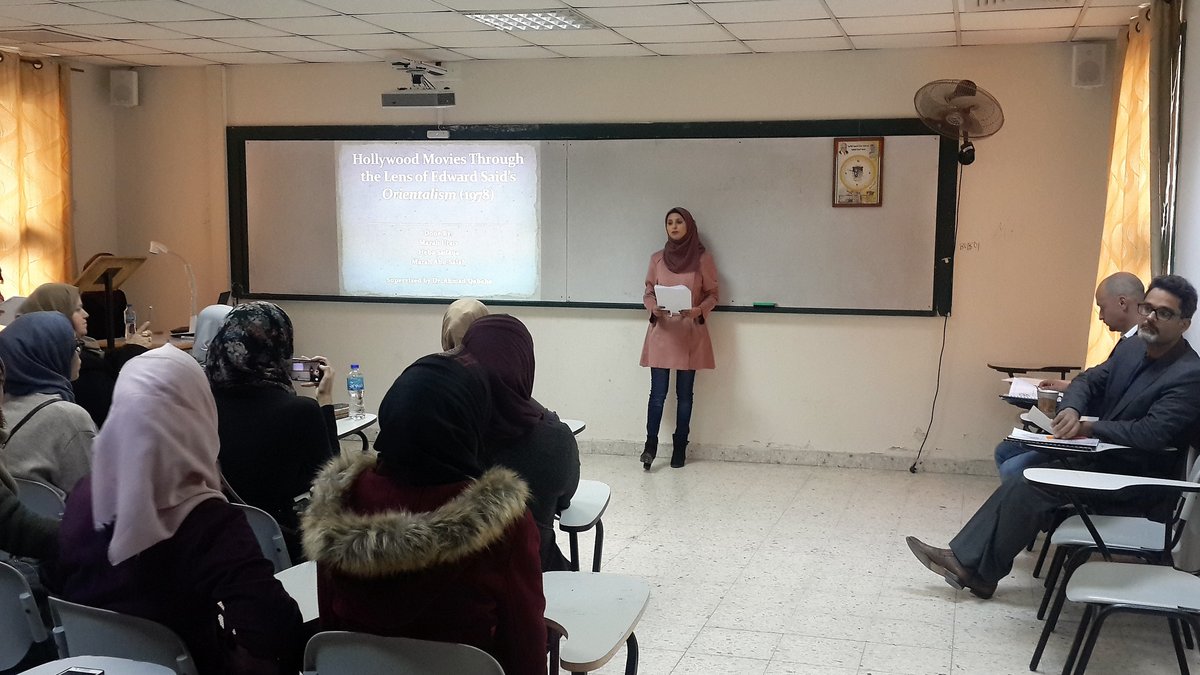
Written by Yacop Cohen..
December 21, 2017 was a special and different day for the English Department. On that day, around 46 English Department students made oral defense of their research projects. Subjects included literature, language, and translation.Topics covered politics and society in literature, society and race in literature , society in cinematography of literature, fundamentalism in literature, educational politics in literature, mythology in literature, translation of literature, design of educational games, analysis of the human nature in literature, ,analysis of subtitling in animated movies, analysis of speech, religion in Shakespeare, and translation of technical texts.
The first seminar was under the supervision and questioning of Dr. Ahmed Qabaha and Dr. Mohammed Hamdan. The first group, to present their project, had Areej Abdullah and Rahma Shaar .The title of their project was “Is Civalization a Veneer? Darkness of the Human Soulin WilliamGolding’s Lord of the Flies and Thomas Hardy’s Heart of Darkness. In their presentation they showed full understanding of the political sphere in the sub -context of literature with a view at society. Next group had three students who took on the task of preparing their mini-theses individually . Sahar Ramadan was first with “Caught in Two Ages: Doctor Faustus’ Crisis of Belonging” with a hard look at the world of literature. She introduced a new way looking at Doctor Faustus and his search for identity. Duha Assi’s paper entitled “The Awakening of Two Women: Ibsen’s Nora and Shaw’s Eliza.” Using literature as a reference point, she dwelt on women’s role in society and its perception of that role. Last student in the group was Ashraqat Sasour with a paper entitled “Torn between Two Types of Prejudice: The Dilemma of Black Women in Stockett’s The Help.” Addressing a sensitive subject, Ashrqat used literature to demonstrate the way the world deals with Black women, using the catalyst of racial rights and women’s rights as a juxtaposition with the novel.
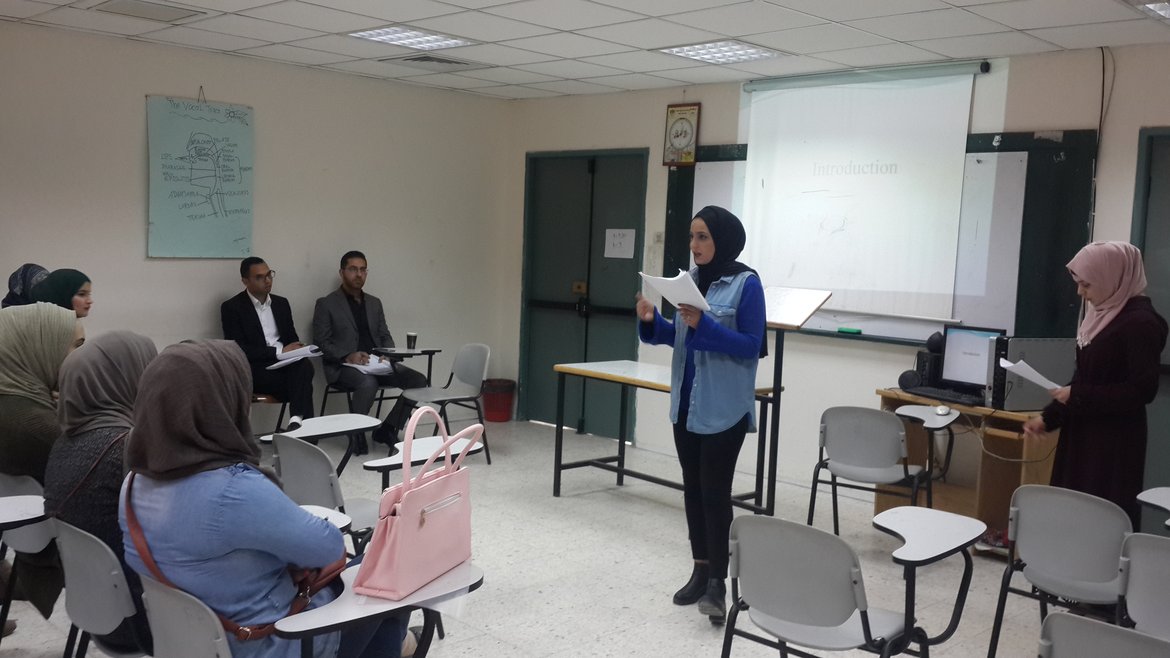
The second seminar was under the supervision of Dr. Abdul Kareem Draghmeh and Dr. Bilal Hamamreh. The seminar had nine students divided into two groups; one had three students; another had four, and a third had two students. The first group had Marah Utair, Heba Sadaqa, and Marah Abu-Salah. Their paper entitled “Hollywood Movies Through the Lens of Edward Said’s Orientalism” examined the way Hollywood depicts the Middle East against the background of Edward Said’s book of the same title . This choice shows how bold the students were in holding a mirror up to the face of Hollywood, showing rights from wrongs in its cinematography. This also showed a deep understanding of Edward Said’s text and a deep understanding of the Arab world. The group Sana’ Sholi, Sarah Amer, and Rawan Attallah, .In their project, “A Postcolonial Reading of Mohsin Hamid’s The Reluctant Fundamentalist,” the students looked into Mohsin Hamid’s most inspired works that dwell on society and religion in the society itself. Their choice of a postcolonial reading shows their confidence in analysis of a text in a way that doesn’t limit their imagination or thinking. Concerning religion, society, and the literary text, theirs was one of most interesting and worthwhile projects presented on that day. The next two presenters on that day for this seminar were Rami Kukhun with his “A Presentist Reading of Brave New World: The Modern Impact of Social Mutation on Politics and Education.” He presented a reading of Aldous Huxley’s Brave New Worldin terms of its influence on education and politics in today’s world. A modern take on a classic novel, Kukhun attempted to show how a more modern look into the novel, one that dealt mainly with education and politics, affects our world today and how one might attempt to perceive it in future projects. The final presentation in seminar was NoufSaleh’s “The Mythological Approach in Analyzing John Synge’s Riders to the Sea.” A classic in the world of drama and a hallmark in our education in the department, Saleh merged two of literature’s most coveted genres and analyzed a text in a way that introduced mythological elements to that world. This way of presenting information and dissecting it in a way new to that text is profound and shows the department’s weighing of important subjects and different ways of interpretation of literary texts.
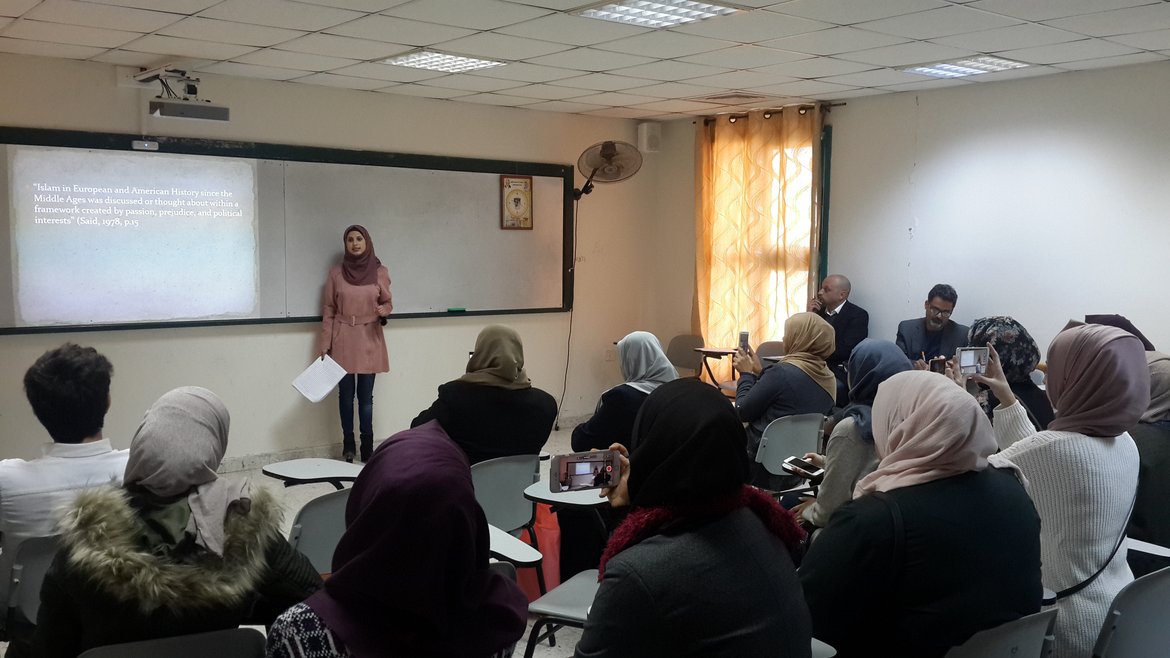
The third seminar on that day, held in room 94, was supervised by Lecturer Iman Hammad and instructor Sameer Mahmoud.The seminar had three groups; two /three-member groups and one/ two-member group. The first presentation in that seminar, delivered by Dalia Qasrawi, Aya Bozia, and Ru’ya Odeh, was entitled “Translation of Roald Dahl’s ‘The Magic Finger/’Children Literature.” Taking on the difficult task of translation, this group translated children lullabies and tales into a modern Arabic version for Arab children to enjoy. The task of translation was very challenging , meaning this project took heavy amounts of reading of different translations and works to provide a coherent translation suitable for young Arab children. The second presentation wasby MaramReda, NiveenNassar, Anas Haj Ahmad. Entitled Designing Two Games: Letters and Numbers for 1st Graders, ” the task at hand for this group was to create a game and demonstrate how it could be used in first grade language calssroomto the game combined learning and fun . This was not an easy task by all means as these students had to design the game from the ground up, designing questions and challenges for the students to face, insuring an educational but fun game. A brilliant idea in itself, one of the members of this project, Anas Haj Ahmad commented that a variation of this game could be “very helpful for young students who like to game all day but not to study. ” Finally, the last group in this seminar was the duo of Hanin Bassan and Shahd Imar with their project entitled “I prefer not to… Bartleby, the Scrivener: Self and Space.” In this paper, the two students turned their attention to one of literature’s most sophisticated works that deal with the human psyche. This project attempted to shed light on the awkward thinking and actions of Bartleby, a scrivener in Wall Street. This character and story is one of Herman Melville’s greatest works, and shows the willingness of these students to dive into the human mind in an attempt to understand more clearly the thinking patterns of this odd character.
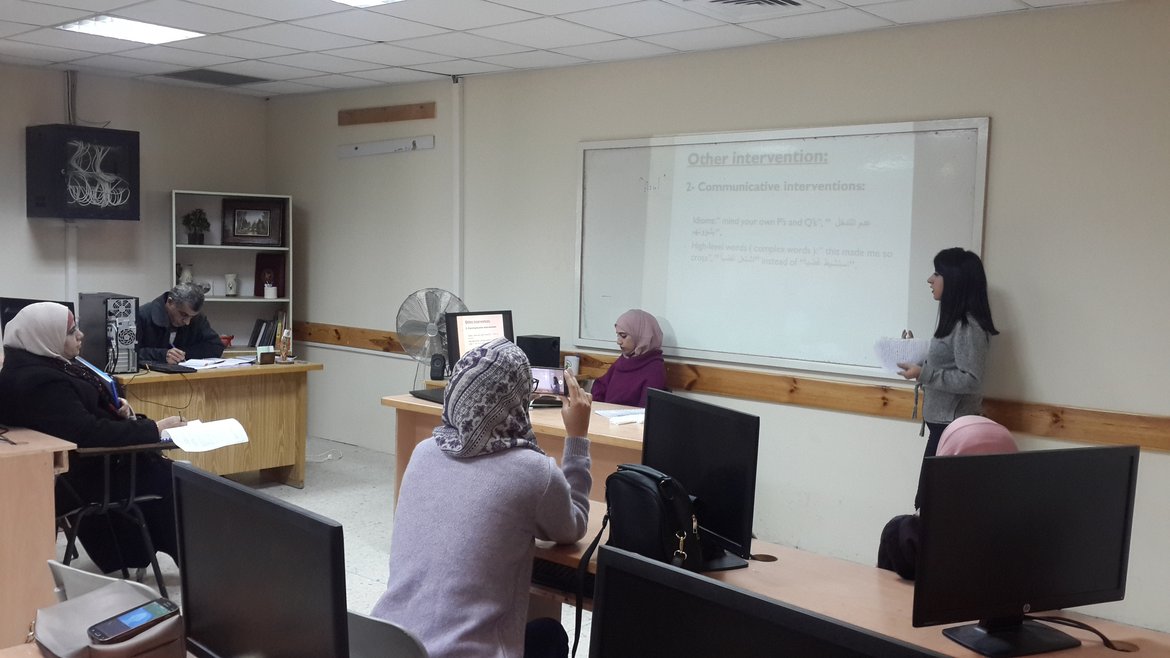
The fourth seminar, held in room 100, was supervised by the pair instructor ReemQa’danand Dr. Sufian Abu Arrah. Two of the seminar participants were Yasmin Abu Obeid and Doa’a Omariya with their “Gender Inversion on Facebook and Palestinian Women.” This project focused on the online discourse in the world of Facebook and how the Palestinian women find it risky of being discriminated against even in the online world. The aim of the project was to call for a refrain from discrimination against women in the online world, for them to have a safe haven from prejudice, and to seek out the ways these women attempted to shield themselves from harm’s way. Another two participants were HadeelAtteyeh and Hiba Al-Alem with their ”Translation Problems in For the Sake of Your Green Eyes.”Another project to deal with translation, Atteyehand Al-Alemventured into world of the the genre of imaginative text; their project had required immense hours of research to get the translation of the text coherent and correct. This project was lauded by professors for the level of professionalism demonstrated in the translation. Finally, the last participants in the seminar were SajaAlawni, QamarQararia, andAbeerSalamah Entitled “Religious Culture in Matran's and Al Wakeel's Translationof Shakespeare's The Merchant of Venice,” the students presented an analysisAl -Wakeel’s translation. This project touched on religion andtranslation of culture from one language culture to another. Not shying away from a difficult task, this project required the immense effortand drawn out finding of research that dealt with the subject at hand. It is a hallmark for the students’ ability to dissect information at a glance and then have the ability to delve further into a piece of information for the purpose of knowing more about it andits making.
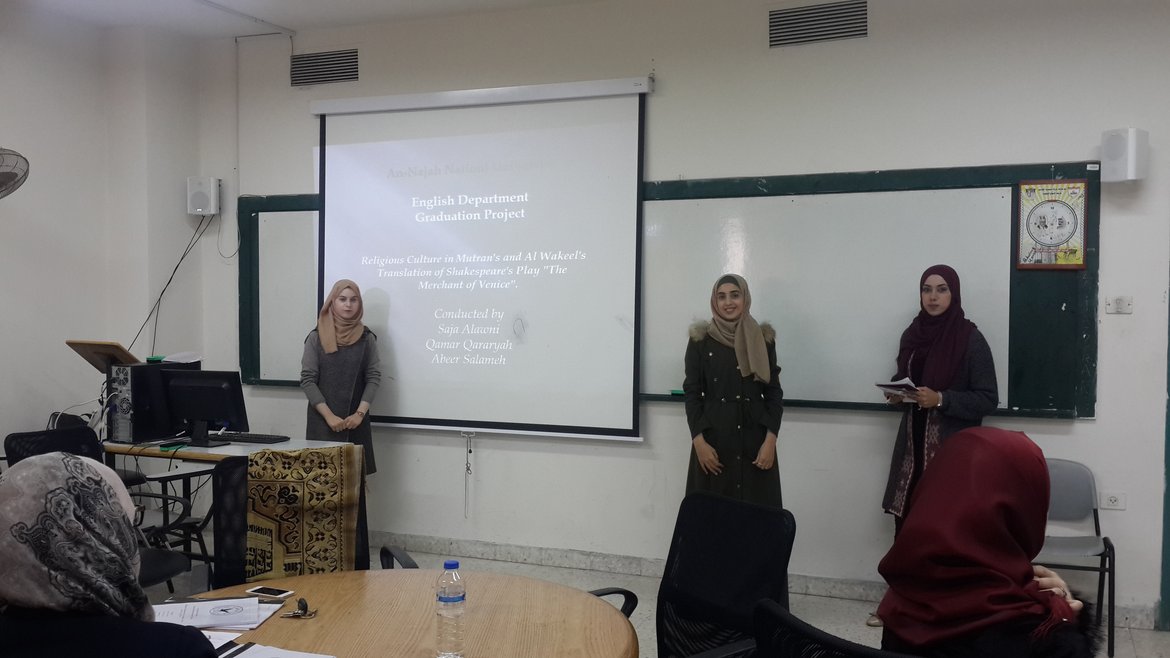
The fifth seminar, held in room 10, was supervised by Dr. RamiQawareeq and Dr. Sameer Isa. They supervised two groups of four members in each The first group had IlhamDeik, Aseel Salah, Lama Darawshah, and RaghdahSrouji with their “Subtitling Implied Meaning in AnimationMovies” With their focus on the world of animation, this group addressed the field of subtitles and the implied meaning behind them, added by those who create and review these movies. Of course, the target group for animated movies are more often than not are young age children .The subtitles presented to them from a movie help them learn the language of the movie . However, often the one who adds and reviews the translated subtitles of these movies gives them meaning beyond the scope of the actual movie and often has deep implied meaning the reader subconsciously takes into consideration and, therefore, this affect his/her opinion of the movie and what it stands for. This project had required the participation of each member, doing their part to insure the original meaning would be understood well and the implied meaning be dissected well so that these meanings could be brought into more focus and judged as they are and not, often, part of the actual dialogue of the movie. This projected opened the minds of audience to the danger of subtitles and how often one watching the movie, reading the subtitles, with the subtitles changing his/her perception of the movie in a way that wasn’t clear before. The last group to present in this seminar had Shifa Marie, Abeer Mahameed, NadinKoni, and Raneen Lahloh with their “Obama's Farwell Speech: A Discourse Analytic Perspective. ” Focusing on presidential discourse, this group focused on the United States’ 44th President and the first African-American president in its history. The project was an analysis of the farewell speech of one of America’s greatest ever presidents and one of the most influential people of his era. This project required the students to delve into each and every word and sentence that came out of the President’s mouth, conveying meaning beyond the scope of the normal listener. A speech of great magnitude, it still swims in the hearts of Americans to this day. The students’ analysis gives it the fullest of honors with the students magnificently conveying the meaning beyond the words adequately and in a way that paints the picture of a great speech of a great man.
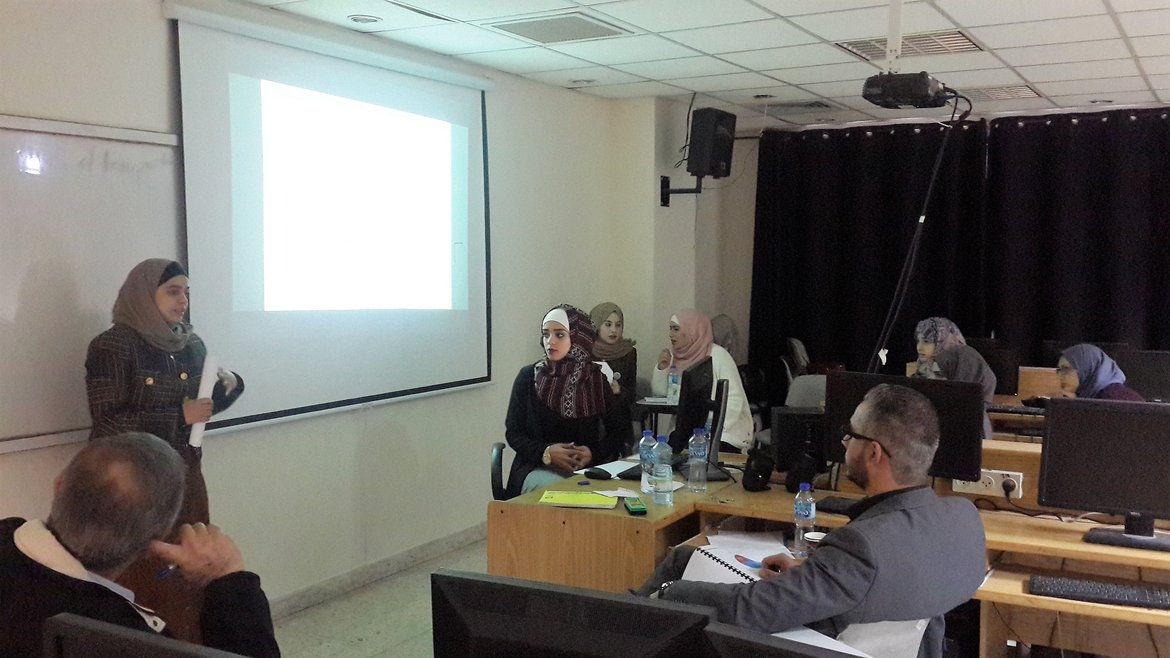
The penultimate seminar of the day was held in room 110 and was supervised by Dr. Fayez Aqel and Department Chair Dr. Ekrema Shihab. This seminar had three students: Budoor Amleh, Abdul Rahman, and Yahya Ayat Sawalha Entitled “Jabra's and Mutran's Translation of Religious Culture in Shakespeare’s Macbeth” was analysis of the translation of Macbeth, one of the greatest works of literature in human recorded history. This projected expected the students to be coherent to be understood by the audience. The project also required the students to fully grasp the play and each of its catalyst parts to insure the translation of this great play gives it justice. The students did brilliantly in this project, diving into the mind of Shakespeare and the world of the play, while also delving into the minds of the translators to insure a full and adequate translation of this play. They also searched through many translations which have dealt with literary and their adequate translations to have a full view on how to correctly assess the translation.
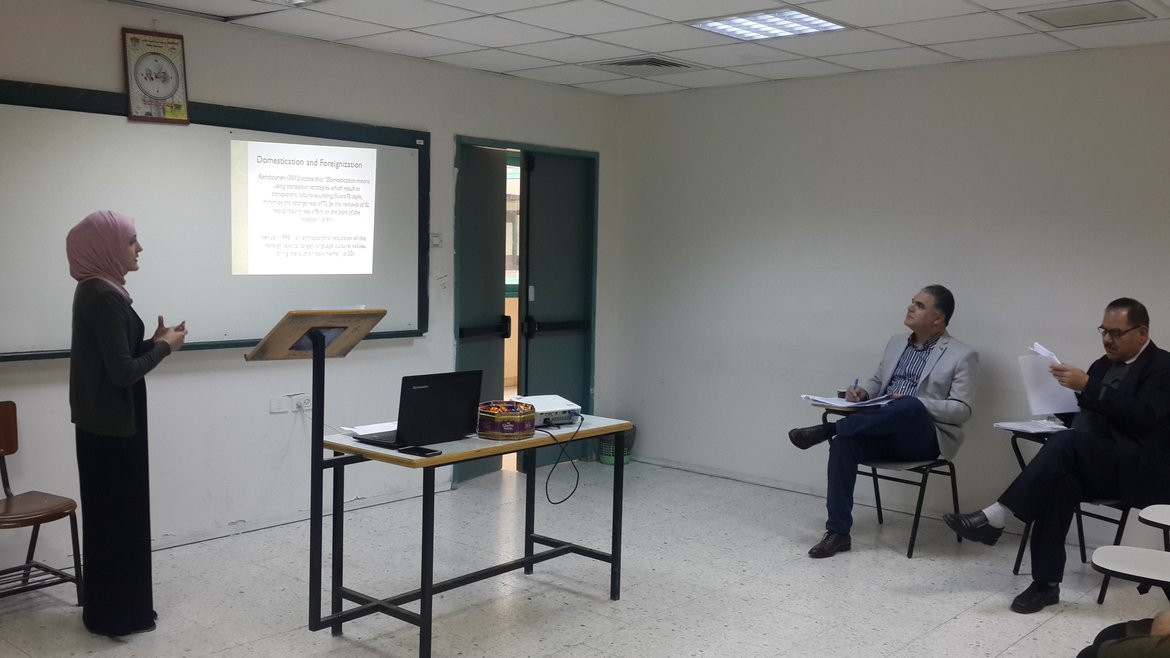
The final seminar of the day, held in room 120, was supervised by Dr. Ekrema Shehab and examined by Dr. Ayman Nazzal and Dr. Ruqayya HerzAllah. The one group seminar, the largest of any on that day, had six students:Yakop Ghazal Cohen, Ibrahim Ramadan, Mays Tayyem, Manar Salameh, Rawan Ghanem, and Ansar Haj Assad. Entitled “Challenges in Translating GautamMukerjee’sEconomics of Globalization,” of the seminar was attended by both classmates, friends, and family members. The project required the students translation of Gautam Mukerjee’s Economics of Globalization, a book consisting of 220 pages, from English into the Arabic. A detailed report was also written, with the book, on the challenges the students faced during the translation and the ways the students overcame them The project required immense work and cooperation on the part of the students in both the translation itself and the report writing on the experience of its translation . Long hours of research were put into the fields of Arabic and English as languages, the world of economics and globalization, and the world of translation. Dr.Nazzal described it as “outstanding” with Dr. Ruqayya, more modestly putting it as “very, very, very good.”
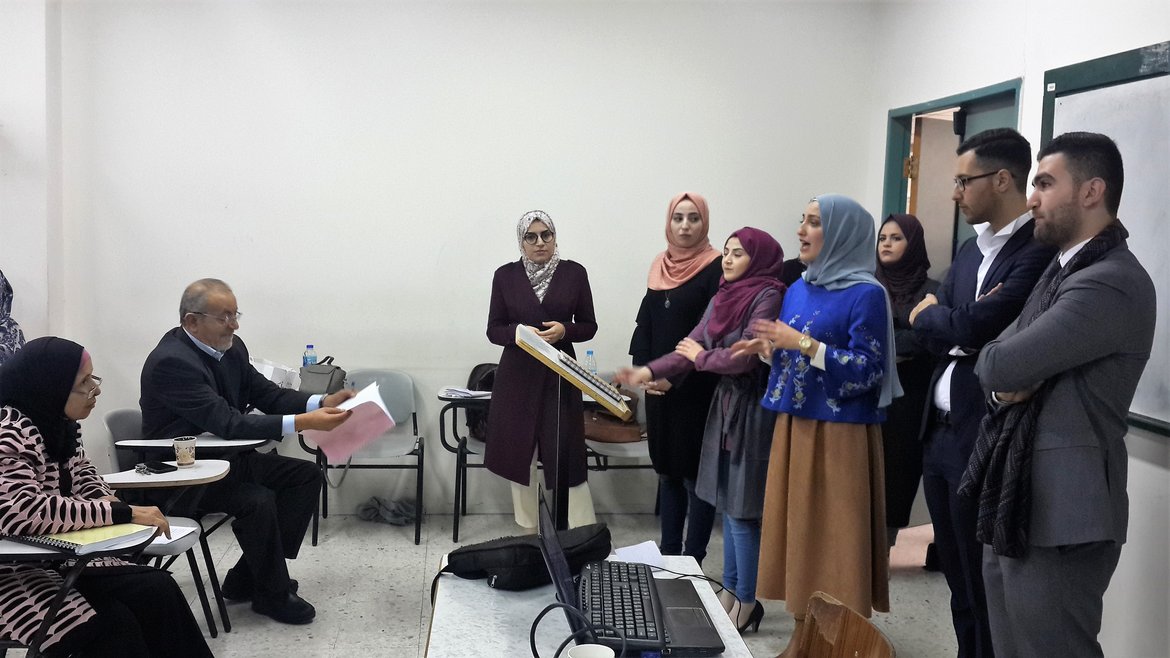
And so forty-six students presented their projects successfully in front of their respective examiners, with friends and family members in attendance. The English Department congratulates these students on their hard work and completion of these projects.
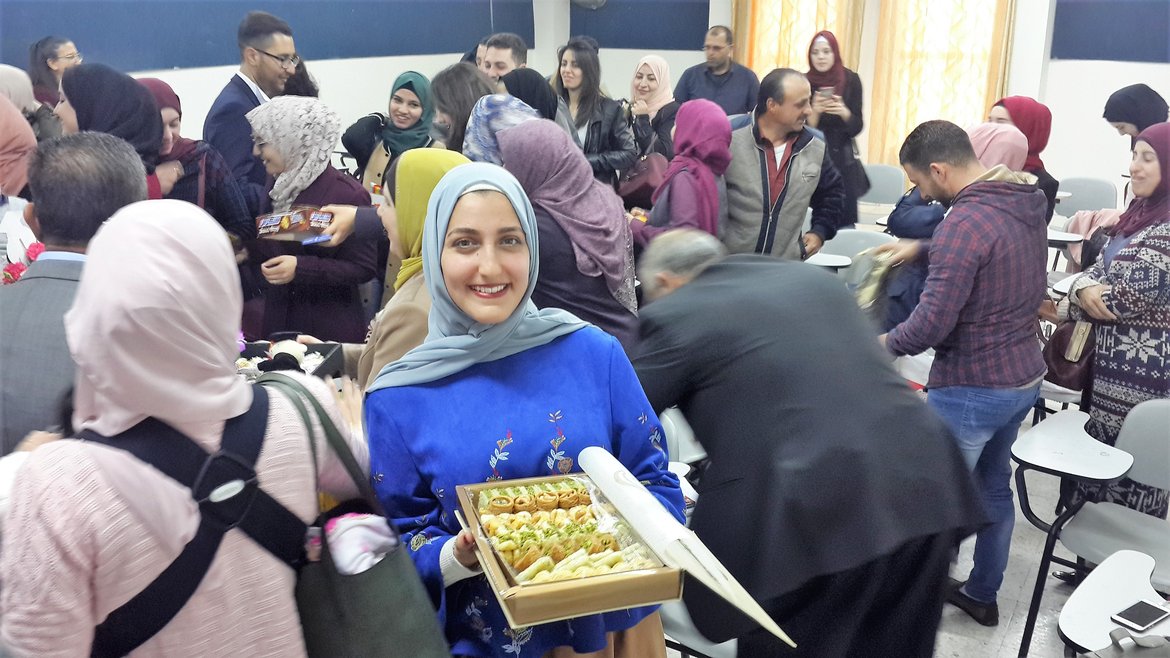
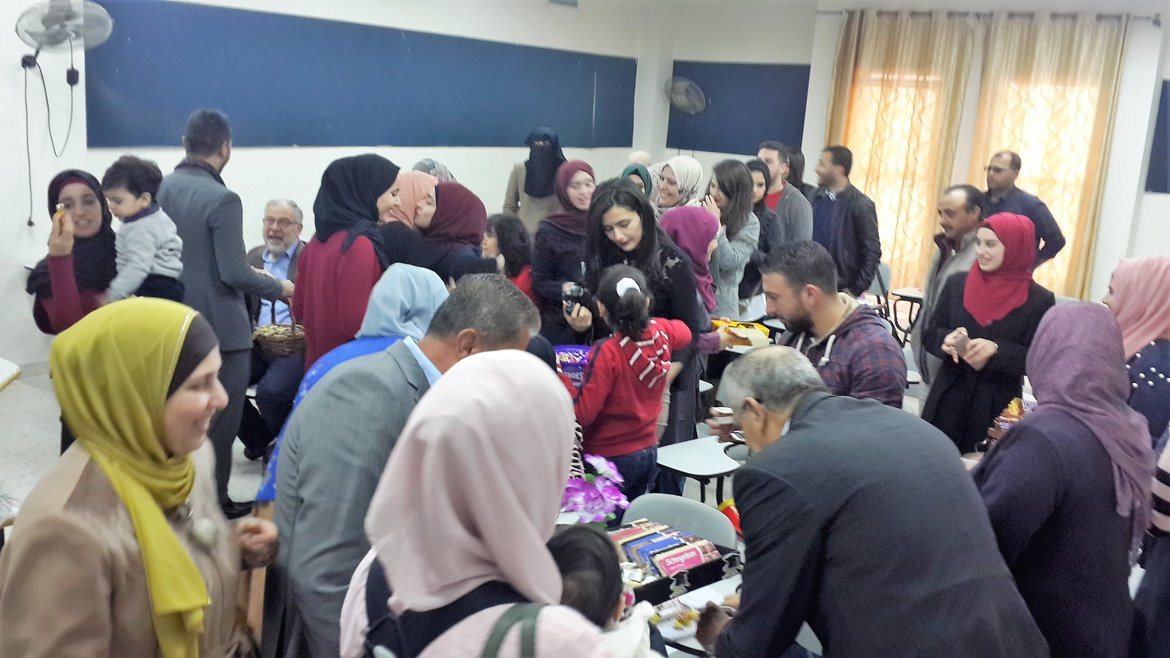
عدد القراءات: 442





